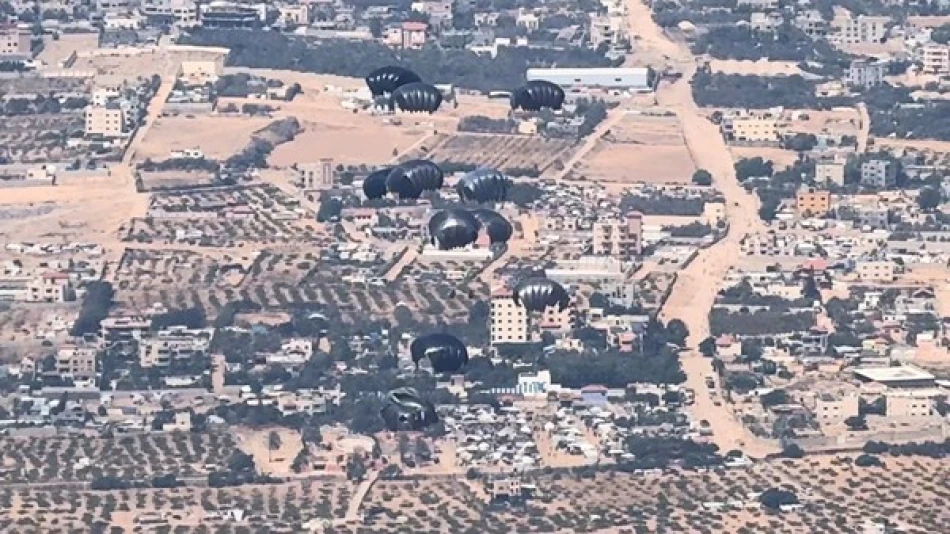
UAE Airdrops Aid to Gaza as Part of 'Goodwill Birds' Relief Operation
UAE Delivers Record 3,750 Tons of Aid to Gaza Through Sustained Airdrop Campaign
The United Arab Emirates has reached a significant milestone in its humanitarian response to Gaza, completing 55 airdrops that have delivered 3,750 tons of essential supplies to isolated areas of the Palestinian territory. Operating under the "Birds of Goodness" initiative in partnership with Jordan, the UAE's sustained aerial campaign represents one of the most substantial international humanitarian efforts targeting Gaza's most inaccessible regions.
Strategic Humanitarian Response Amid Access Challenges
The UAE's "Noble Knight 3" operation demonstrates how Gulf states are adapting their humanitarian strategies to overcome ground-level access restrictions. Unlike traditional aid delivery methods that rely on border crossings and overland routes, the airdrop approach allows humanitarian supplies to reach areas that have become completely cut off due to security conditions.
The 55 completed airdrops represent a methodical, sustained effort rather than a one-time emergency response. This consistency suggests the UAE has developed significant logistical capabilities for long-term aerial humanitarian operations, positioning the country as a key player in crisis response mechanisms.
Scale and Scope of Aid Delivery
Tonnage Puts UAE Among Top Gaza Aid Contributors
The 3,750-ton figure places the UAE's contribution among the most substantial international aid efforts to Gaza. For context, this volume represents enough basic supplies to support tens of thousands of families for extended periods. The aid package focuses on essential food items and vital supplies specifically chosen to address the most urgent needs of displaced families.
The partnership with Jordan adds strategic value, as Jordan's geographic position and established humanitarian infrastructure make it an ideal staging ground for Gaza-bound operations. This collaboration also reflects broader regional coordination that could serve as a model for future crisis responses.
Implications for Regional Humanitarian Leadership
UAE's Expanding Soft Power Strategy
This operation reinforces the UAE's positioning as a regional humanitarian hub, building on its established role in Yemen, Syria, and other crisis zones. The sustained nature of the campaign—55 operations over consecutive periods—signals institutional commitment rather than symbolic gesturing.
The UAE's emphasis on multi-modal delivery systems (air, land, and sea) suggests the country is developing comprehensive crisis response capabilities that could be deployed in future regional emergencies. This approach enhances the UAE's diplomatic influence while addressing genuine humanitarian needs.
Operational Significance and Future Outlook
The UAE's commitment to continue operations through various delivery methods indicates this humanitarian campaign will likely expand rather than wind down. The coordination with regional and international partners mentioned in official statements suggests potential for scaling up operations if access conditions improve or deteriorate further.
From a strategic perspective, the UAE's approach demonstrates how middle powers can leverage technological capabilities and regional partnerships to deliver meaningful humanitarian impact in complex crisis environments. The success of this model may influence how other Gulf states approach similar challenges in the region.
Most Viewed News

 Layla Al Mansoori
Layla Al Mansoori






